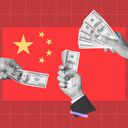While the U.S. plays tough, the rest of the world is showing that it needs China

Published Date: 1/25/2020
Source: axios.com
DAVOS, Switzerland — The Trump administration is gearing up for a long-term confrontation with China, a rival viewed increasingly as an existential threat, but a week in Davos offers a stark reminder that the world is not prepared to line up behind it.The big picture: There was a palpable sense of relief among the Davos crowd after the "phase one" trade deal reduced tensions between the U.S. and China. But while both parties in D.C. think this is just the beginning, the executives we spoke to see it as a sign that the world's biggest market remains a can't-miss opportunity.Experts, executives and most world leaders agree: China is too big and advancing too fast to be forced out of the equation.On 5G technology, where the U.S. has squeezed allies hard to convince them to shun China’s Huawei, the U.K. and Germany, among others, are hedging their bets, and China is using leverage of its own.Electric vehicle manufacturing is just one example of an industry where it’s not possible to be competitive globally without employing Chinese technology, says Adam Tooze, a historian at Columbia University.The dependency goes both ways. Most consumer electronics, including nearly all computers and smartphones, are made in China, while China still relies on U.S. semiconductors and software. “It’s more of a Washington sentiment than it is a business sentiment,” Kelly Grier, U.S. chair and managing partner of Ernst & Young, says of hawkish claims that doing business in China crosses security and ethical boundaries.The recent trade war escalation provided a “wake-up call” to U.S. business about just how dependent they had become on China, Grier says. They're adjusting, but not prepared to walk away from that market.But, but, but: “The bipartisan mobilization around this issue is a game-changer,” Tooze says. Even if Trump is only searching for short-term political advantage — he gushed about his friendship with Xi Jinping while in Davos — the Pentagon is not.Heads of state now find themselves walking a tightrope between two giants."Whereas it was previously effortless to say, 'I am friends with everybody and including friends with the United States and with China,' now we still want to be friends with everybody but you are pushed to be better friends with one side or the other," Singapore Prime Minister Lee Hsien Loong said in an address.Many, if forced, will choose China. Consider African countries dependent on Beijing for investment and infrastructure. “The pressure they’re under is not from nagging human rights defenders in the West,” says David Miliband, CEO of the International Rescue Committee. It’s from China.“If you’re in the Asia-Pacific — every single country’s main source of imports is China," notes Carlos Pascual of IHS Markit and a former senior U.S. diplomat. “Are those countries going to break economic relations with China? Unlikely.”What to watch: As the U.S. and China begin to disentangle parts of their economies, business leaders are looking for new friends and partners while hoping they can play in both the U.S. and Chinese markets as long as possible.The bottom line: “We’re navigating a zone we’ve never been in before. It was all so much simpler during the Cold War," says Tooze.Go deeper:How AI, surveillance and biometrics could converge in a tech arms raceHow tech leaders used Davos this yearDavos leaders don't know how to deal with China's economic systemA Davos conversation on maximizing happiness, not GDP